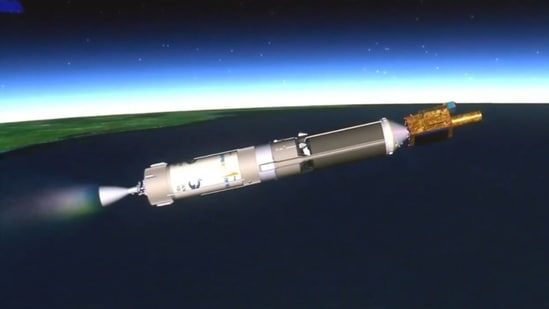Isro's 'eye in the sky' satellite blasts off but fails to reach orbit
The satellite was launched on a Geosynchronous Satellite Launch Vehicle (GSLV) from the Satish Dhawan Space Centre (SDSC) at Sriharikota in Andhra Pradesh as a part of the GSLV-F10 EOS-03 mission.
The Indian Space Research Organisation (Isro) launched India's "eye in the sky" GISAT-1 Earth observation satellite (EOS) on Thursday, but the mission suffered a setback due to a performance anomaly in the cryogenic stage of the rocket moments after the launch. Isro said that rocket performance was normal in the first and second stages but hit a technical snag in the subsequent phase. "GSLV-F10 launch took place today at 0543 Hrs IST as scheduled. Performance of first and second stages was normal. However, Cryogenic Upper Stage ignition did not happen due to technical anomaly. The mission couldn't be accomplished as intended," the space agency tweeted.

Union minister of state (MoS) in charge of the department of space Jitendra Singh said that he has discussed the matter at length with the Isro chairman, adding that the mission can be re-scheduled some time again. "Spoke to Isro chairman Dr K Sivan and discussed in detail," Singh minister tweeted. "The first two stages went off fine, only after that, there was a difficulty in the cryogenic upper stage ignition. The mission can be re-scheduled some time again," he said.
The satellite was launched on a Geosynchronous Satellite Launch Vehicle (GSLV) from the Satish Dhawan Space Centre (SDSC) at Sriharikota in Andhra Pradesh as a part of the GSLV-F10 EOS-03 mission. India watched the much-touted event with fascination, which was set up days before people celebrate the country's achievements on Independence Day.
Click here for key highlights from the Isro GSLV-F10 satellite launch
As the 26-hour countdown for Thursday's launch concluded, the 51.70-metre tall rocket lifted off majestically at 5.43am from the second launch pad at the Sriharikota spaceport. Minutes after the launch, the satellite was said to have successfully completed its second stage, following which it commenced cryogenic operations in the third phase.
However, Isro chairman K Sivan said moments later that the mission could not be completed successfully. "There was an anomaly observed in the cryogenic stage. Isro's GSLV-F10/EOS-03 mission could not be fully accomplished," Sivan was heard saying during the live telecast of the launch.
Researchers directing the mission were not receiving performance data from the cryogenic engine, officials familiar with the matter said.
Isro said earlier that the Earth observation satellite was to be placed by the launch vehicle in the Geosynchronous transfer orbit (GTO), a highly elliptic geocentric orbit that almost always serves as an intermediate step for satellites before reaching for their final orbit. After that, the satellite was expected to make its way to the final geostationary orbit with the help of an onboard propulsion system.
This time, the space agency even made some changes to the fairing capsule used in its satellite. Isro said that in a first, it sent an Ogive-shaped payload measuring a diameter of 4 metres.
The GISAT-1 satellite intended to obtain spectral signatures for agriculture, forestry, mineralogy, cloud properties, snow and glaciers, and oceanography, enabling researchers back home to gain new insight on a host of issues. On the basis of these photographs, India was expected to be able to monitor and respond to natural disasters and any other short-term events at an alarming pace, according to officials of the space agency familiar with the matter.
Get Current Updates on India News, Lok Sabha Election 2024 live, Infosys Q4 Results Live, Elections 2024, Election 2024 Date along with Latest News and Top Headlines from India and around the world.



